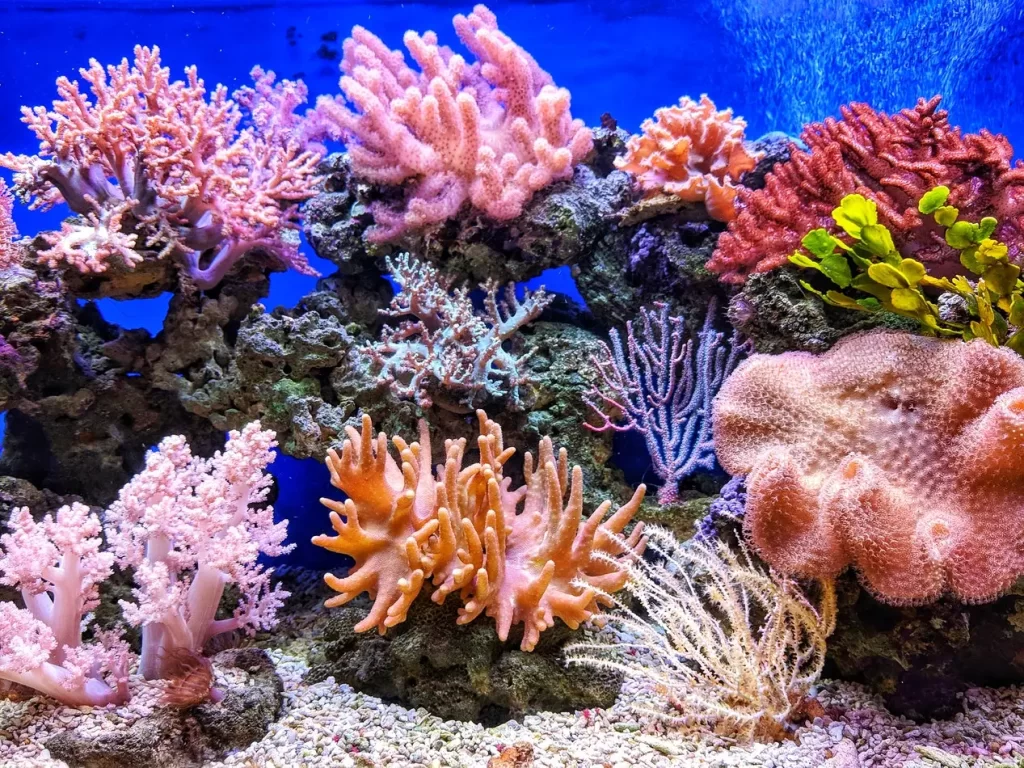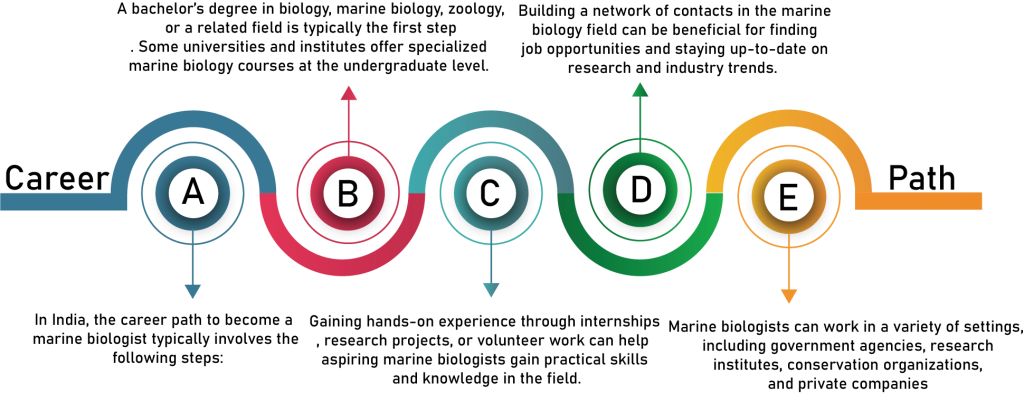Marine biology is the scientific study of life in the ocean and other saltwater environments, including the study of the physical and chemical properties of the ocean and its interactions with the atmosphere and land. It encompasses a broad range of scientific disciplines, including ecology, genetics, physiology, anatomy, oceanography, and conservation biology. The study of marine biology is important for understanding the biodiversity of the ocean and its role in sustaining life on Earth, as well as for developing strategies for conservation and management of marine resources.

Work description
- Conducting research and experiments in marine biology labs
- Analyzing and interpreting data on marine life and their habitats
- Developing conservation and management strategies for marine ecosystems
- Conducting fieldwork in marine environments such as oceans, seas, and estuaries
- Collecting samples of marine organisms and studying their behavior, physiology, and ecology
- Collaborating with other scientists, policymakers, and stakeholders to address marine conservation issues
High Demand
Opportunities for travel and exploration
Lucrative salaries
Opportunities to make a significant impact on conservation efforts and marine ecosystem management
Opportunities for innovation
Wide range of career paths available, including research, education, and policy-making
Versatility
Exciting and rewarding work
Flexibility
Ability to work outdoors and in a variety of environments
Job satisfaction
Opportunities for collaboration with other scientists and stakeholders
High stress
Highly competitive job market
Long hours
Often requires long hours and time away from home for fieldwork
Competitive field
Requires specialized education and training
Constant learning
Can be physically demanding, requiring good physical fitness and swimming ability
Isolation
Can be emotionally challenging, particularly when working with endangered species or witnessing damage to marine ecosystems
Eye strain and other physical health issues
Potential for exposure to hazardous materials or situations, such as extreme weather or dangerous marine animals
To pursue a career in marine biology in India, you would typically need to obtain a bachelor’s degree, master’s degree, or PhD in marine biology or a related field. The cost of education can vary depending on the institution and the program, but on average, you could expect to spend:
Bachelor’s degree in marine biology: 3-4 lakhs INR
Master’s degree in marine biology: 2-3 lakhs INR
PhD in marine biology: 1-2 lakhs INR
In addition to tuition costs, you may also need to budget for textbooks, laboratory fees, and fieldwork expenses such as transportation, lodging, and equipment.
[wpcharts type=”horizontalbarchart” bgcolor=”red:gray:yellow,blue:gray:yellow,random:gray:yellow,purple:gray:yellow” min=”0″ legend=”true” titles=”2 year , 5 year” values=”3,7,5,12″]
The earning potential of a marine biologist in India can vary depending on factors such as level of education, type of employer, and years of experience.
As a rough estimate, the starting salary for a marine biologist in India is around 2-4 lakhs INR per annum.
With experience, the salary can increase to 6-8 lakhs INR per annum or more, depending on the job and employer.
Opportunities for advancement and higher salaries are available in research, education, and policy-making positions. However, it’s worth noting that salaries in the field of marine biology may not be as high as in some other fields, and funding for research and conservation efforts can also be limited.
[wpcharts type=”horizontalbarchart” bgcolor=”red:gray:yellow,blue:gray:yellow,random:gray:yellow,purple:gray:yellow” min=”0″ legend=”false” titles=”Entry-Level, Mid-Career, Senior-Level ” values=”5,15,25,35,45,55″]
Strong interest in marine life and the ocean ecosystem.
Good academic background in biology, chemistry, and physics.
Excellent observation and analytical skills.
Ability to work in the field, sometimes under harsh weather and physical conditions.
Strong communication and teamwork skills to collaborate with other scientists and stakeholders.
Willingness to continue learning and adapting to new technologies and scientific findings.
Patience and perseverance to conduct long-term research projects.
Fear or discomfort with water or marine environments
Allergies or other health issues that could limit the ability to work in the field or laboratory
Poor time management or organizational skills, which can be particularly challenging for fieldwork or long-term research projects
Difficulty with certain academic subjects or scientific concepts required for the field, such as statistics or molecular biology
Inadequate math and science skills.
Poor communication or interpersonal skills, which can be crucial for collaborations and community engagement
Lack of willingness to engage with policy or management aspects of marine conservation, which can be an important part of the work in this field.
Work-life balance
The work-life balance of a marine biologist can vary depending on their specific job, employer, and research projects. Generally, marine biologists can expect to spend a significant amount of time conducting fieldwork, which may involve long hours and working in remote or challenging environments. However, they also typically have opportunities for flexible scheduling and may have the option to work from home or in an office setting when not in the field.
Marine biologists who work in research or academic settings may have more control over their schedule and workload than those who work in government agencies or private companies.
It’s important to note that work-life balance can be challenging for marine biologists who are passionate about their work and feel a sense of responsibility for the conservation of marine ecosystems. However, many employers and organizations recognize the importance of maintaining a healthy work-life balance and offer benefits such as flexible schedules, remote work options, and time off for personal and family needs.

Advancement of knowledge and understanding of marine ecosystems, biodiversity, and conservation.
Development of strategies and technologies for sustainable management of marine resources.
Identification and mitigation of environmental threats to marine ecosystems, such as pollution and climate change.
Contribution to public education and awareness of marine biology and conservation issues.
Job creation and economic development in industries related to marine biology, such as fisheries, aquaculture, and tourism.
Collaboration with international organizations and governments to promote global marine conservation efforts.
Marine ecology
Involves developing algorithms that enable machines to learn from data and make decisions without human intervention.
Marine conservation biology
Focuses on the protection and management of marine biodiversity and ecosystems
Marine microbiology
Study of microorganisms in marine environments, including bacteria, viruses, and protists
Marine genetics
Investigation of genetic diversity and adaptation of marine organisms
Marine fisheries
Management and conservation of fish populations and the fishing industry



